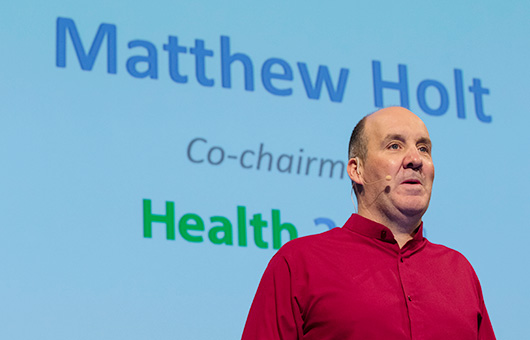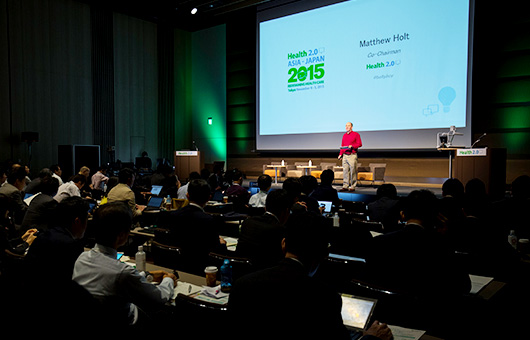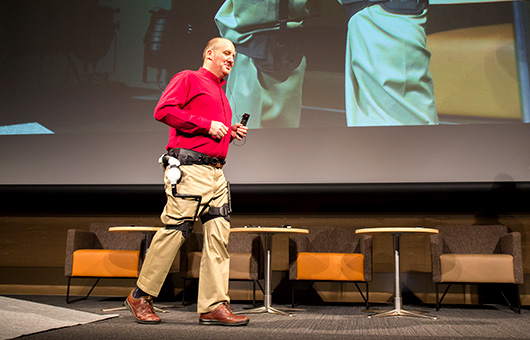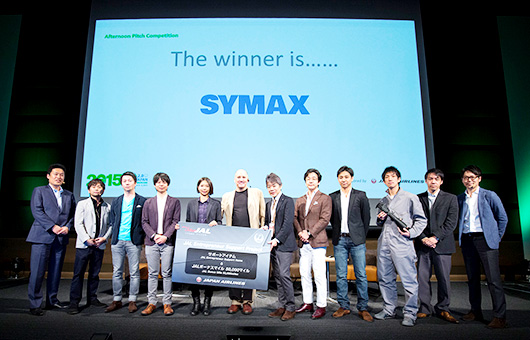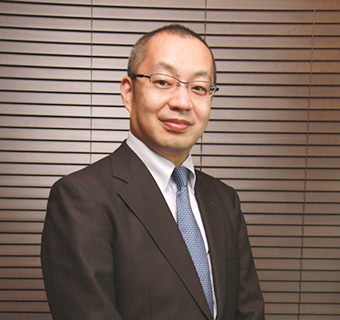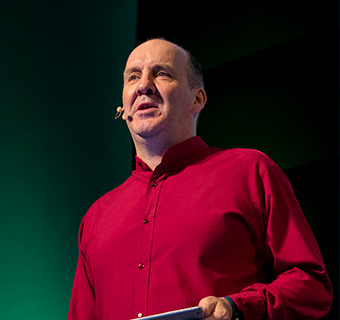メドピアには、次のステージとして
医師たちと共により大きなビジネスに挑んで欲しいHealth 2.0 共同創設者 Matthew Holt
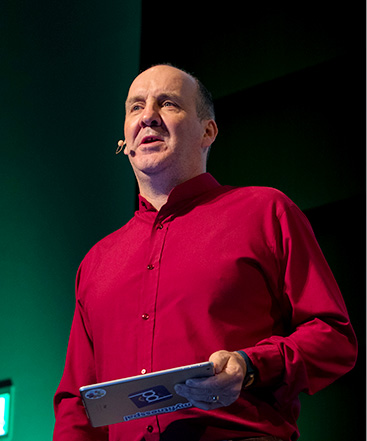
Health 2.0 共同創設者 Matthew Holt
Matthew HoltはHealth 2.0の共同創設者。英国ロンドン出身。1990年代は米国のInstitute for the Future(未来研究所)にてヘルスケアの未来学者、そして市場調査会社のHarris Interactiveにてアナリストを務める。2000年代初めには、PHRのスタートアップに籍を置き、その頃から今や10万人の読者を誇るヘルスケア分野では著名なブログ、「The Health Care Blog(THCB)」の執筆をつづけ、その後、Health 2.0の設立に参画。THCBは現在、Health 2.0のメディアの一つになっており、Matthewも時折寄稿している。
「Health 2.0」は、医療・ヘルスケア分野における最新のテクノロジー(ヘルステック)とそれを活用した先進事例を紹介する、世界最大規模かつ最もアクティブなグローバルカンファレンスです。2007年に米国で始まり世界各国へと広がる中、日本には2011年11月に、当社との共催で初進出しました。
石見と出会ったきっかけや、その時の印象について教えていただけますでしょうか?
How did you meet Yo Iwami and what were your impressions?
2009年にサンフランシスコで開催した「Health 2.0」で出会った
石見さんとは、2009年にサンフランシスコで開催したHealth 2.0のカンファレンスで初めて出会い、2010年にヨーロッパ初としてパリでHealth 2.0を開催したときに再開しました。そのときメドピアは日本で既に軌道に乗り始めており、その成功にとても感銘を受けました。そして、2010年にサンフランシスコで開催したHealth 2.0では、メドピアに講演をしてもらいましたが、そのとき私たちは既に一緒に何かできないかと話し始めていました。
また、陽(石見)の静かで穏やかな人柄には、いつも感銘を受けていました。荒々しくてクレイジーなIT起業家というよりは、まじめな科学者という印象で、日本でもあまり出会ったことのないタイプです。その彼の人柄こそが、日本の医療業界における彼とメドピアの成功につながっていくでしょう。
I met Dr Iwami in 2009 in San Francisco at the Health 2.0 Annual Conference and again in 2010 in Paris where we had the first Health 2.0 Europe. By then MedPeer was already well off the ground in Japan, and I was very impressed by the success he already had. MedPeer presented in a session at Health 2.0 2010 Annual Conference in San Francisco, and by then we were already discussing how to cooperate internationally.
I was always personally struck by Yo’s quiet and calm personal style. He comes over more as a serious scientist than a wild and crazy internet entrepreneur (and I’ve met a few of those even in Japan!). I believe that translates well into his and MedPeer’s success with the medical community in Japan.
2015年にHealth 2.0が日本に進出したのはなぜでしょうか?
Why did Health 2.0 expand to Japan in 2015?
今後のヘルステックにおいて、日本のマーケットには大きなチャンスがある
Health 2.0のカンファレンスは、2007年にアメリカで始めました。その後2010年にはヨーロッパで初開催し、今や7ヶ国で開催しています。メドピアとは、2011年には日本に進出しようと話をしていたのですが、東日本大震災が起こったため遅らせることにしました。
日本は、今後のヘルステックにおいてとても魅力的なマーケットであり、大きなチャンスがあると思っています。なぜなら日本は、金額においては世界で2番目の規模を誇る医療制度を持ち、強力かつ公平な皆保険制度を整備しているにも関わらず、ヘルスケア領域での技術的インフラでは他国に遅れをとっているからです。これは、一般的に技術が進んでいる日本においてとても驚くべき状況です。
また、日本では「スタートアップの文化」がまだ根付いていないということもあります。この状況は、日本のスタートアップにとって、Health 2.0の概念に基づく新しい技術によって、医療システムをさらに発展させる大きなチャンスです。そしてそれは、未だ古い伝統的な制度を維持している他国を追い越して成長できるでしょう。
Health 2.0 started running conferences in the US in 2007 and by 2010 had our first conference in Europe, where we have now had 7 annual conferences! We were in early discussions with MedPeer about coming to Japan in 2011 but the tragic tsunami derailed that.
We regard Japan as a very interesting market and huge opportunity for new health technologies. It’s the second biggest health care system (by money) in the world, and while it has a strong and equitable underlying universal insurance system, the technological infrastructure of the health sector is some way behind other nations. That’s pretty amazing given the generally advanced technology in Japan.
There is also only a small “startup culture”. We think that this is actually a huge opportunity for Japanese startups to expand Health 2.0 technologies into the health care system, and possibly “leapfrog” some other nations who are dealing with older entrenched systems.
日本進出のパートナーとして、なぜメドピアを選ばれたのでしょうか?
Why did you choose MedPeer as a partner?
メドピアはヘルステックのスタートアップとして日本で地位を確立していた
メドピアと組んだ一番の理由は、石見さんそして脇丸さんたちと築き上げてきた強固な関係性です。Health 2.0のようなアメリカの小さな企業が海外に進出するためには、当然強力なパートナーが必要でした。その他の理由としては、メドピアは東京市場で既に上場を果たしており、ヘルステックのスタートアップにおいては確立された企業であることもありました。そのため、(2015年にメドピアと日本で初開催をした時には)MSDやソニーのような大手からスタートアップ企業まで、幅広くHealth 2.0につないでくれました。
The main reason for working with MedPeer was the strong personal relationships we had developed with Yo Iwami and Toshiro Wakimaru and their colleagues. Obviously for a small American company like Health 2.0 to expand overseas we need great partners. The other reason was that by then MedPeer had already successfully IPOed on the Tokyo Stock Exchange and was an established company in the “health tech startup” space which gave us connections to both large companies like MSD and Sony, and to smaller startups.
ヘルステック業界において、これからのメドピアに期待されることは何でしょうか?
What do you expect from MedPeer in the health tech business?
メドピアには、領域を拡大しながら、医師の中での存在を確立していってもらいたい
メドピアは専門家同士のオンラインナレッジ共有で成功し、それはまさに”Health 2.0”にあたるものですが、医師たちと共にそれをより大きなビジネスにするチャンスが十分にあると確信しています。明らかに広げられる領域は2つあり、1つは、(まだ医療領域では試されていない技術を医師自身に試してもらいながら)新しいサービスや技術を展開すること、もう1つは医師と患者をオンライン上でつなげるサービス、つまりバーチャルクリニックを立ち上げることです。インターネット新時代で最も難しいのは、きちんと利用される価値あるコミュニティを作り上げることです。そしてそれを成し得た”勝者”と言えば、FacebookやLinkedin、Line、WeChatといった、ユーザーに提供するサービスを拡大させるとてつもない力を持った企業です。メドピアは既に大変なステージは乗り越えています。だから次にメドピアに期待するのは、様々なサービスを加えていくことで日本の医師の中での存在を強固にしていくことです。もちろん、陽(石見)や彼のチームが私たちを驚かせてくれることを期待しています!
I believe MedPeer has a great opportunity to turn its success in professional online knowledge exchange (which is Health 2.0’s term for the type of company they are) into a wider business working with physicians. The two obvious arenas for expansion are marketing other services and technologies to physicians (including having them test other people’s technologies), and building out an on-line/physical service connecting physicians with patients—a virtual clinic. The hardest thing to do in the new Internet age is to build a successful valuable community who use it regularly, and the “winners” who do that are companies like Facebook, Linkedin, Line, WeChat, who of course have tremendous ability to grow the services they provide to their users. MedPeer has already done that hard part, so next I would expect MedPeer to consolidate its position among Japanese physicians by adding more services. Of course, I also expect Yo and his team to surprise us!
